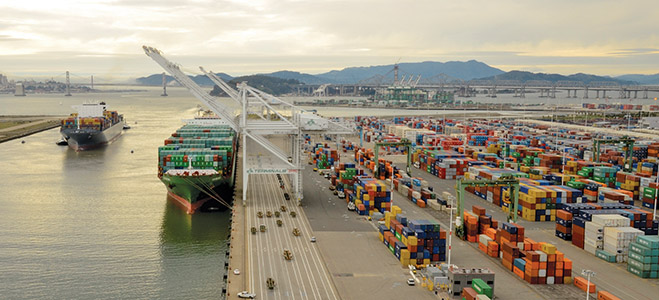A sales tax extension and augmentation approved by voters in last monthís election should be good news for international shippers. Thatís the word from the Port of Oakland, which today applauded passage of Measure BB on the ballot.

The Port of Oakland said its September cargo handling volume was the highest in more than a year, and the numbers will stay high as shippers divert cargo north to avoid severely congested Southern California ports. Photo by John Perry
By Patrick Burnson
Published: December, 2014
A sales tax extension and augmentation approved by voters in last month’s election should be good news for international shippers. That’s the word from the Port of Oakland, which today applauded passage of Measure BB on the ballot. The initiative extends the life of an existing half-cent sales tax in Alameda County. It also adds another half-cent to the levy.
“We congratulate voters for assuring a dedicated funding stream for critical transportation improvement projects in Alameda County,” the port said in a statement. “With state and federal funds for transportation declining in the last decade, this will help reduce traffic congestion and improve goods movement.”
Port of Oakland Notes Increase in Cargo Volume
In related news breaking late last month, the Port of Oakland maintained that it is positioned to increase its cargo volume in California’s turbulent container shipping market. But there’s more to do to ensure that the nation’s fifth-busiest seaport can handle the load.
That was the message from major U.S. importers and exporters at a two-day customer forum. Shippers from Safeway to Tesla Motors urged the port to prepare by optimizing cargo movement and minimizing bottlenecks.
“The Port of Oakland is in a very strong position to handle additional cargo, but the port will need to increase hours of operation with additional gates,” said Joel McClure, director of international logistics at Restoration Hardware.
Ten leading brands in retailing, manufacturing and freight forwarding took part in the forum designed to gauge customer attitudes and solicit feedback on ways to make the port more efficient. They applauded efforts to improve cargo throughput at Oakland marine terminals, but asked terminal operators for more help to ensure smoother movement of imports out of the port to warehouses or store loading docks.
The discourse is important as the Port of Oakland gears up for a likely increase in containerized cargo. The port said its September cargo handling volume was the highest in more than a year, and the numbers will stay high as shippers divert cargo north to avoid severely congested Southern California ports. Oakland terminal operators said they’re handling hundreds of additional containers weekly originally intended for Los Angeles or Long Beach.
One port executive said an Asian-based container shipping line will divert one of its vessels this month, with Oakland as a first port of call replacing Los Angeles. That means the vessel will make Oakland its first West Coast stop for discharge of imports from Asia.
Shippers expressed their approval of first-call service in Oakland. It would assure faster delivery of cargo intended for Northern California as well as cargo moving to inland destinations.
But shippers also asked for help with bottlenecks that include:
• A need for quicker trucker turn-times in and out of the marine terminals; and
• A need to expand hours of operation at marine terminals.
The port said it is advancing on both fronts. Terminal operators indicated that trucker waiting time has improved in the last half of 2014. Some facilities have introduced nighttime truck gates and extended hours of operation. At least two have adopted express lanes that get imports out the door in as little as 15 minutes.
“We’re making progress,” said Port of Oakland Executive Director Chris Lytle. “We want to help you and encourage more cargo through the port.”
Port officials said Oakland does not have the level of congestion currently delaying cargo in Southern California. They said there is available capacity bolstered by the addition of new cargo handling equipment. There’s also a satisfactory supply of chassis, the trailers truckers use to haul containers.
Matson Acquires New Alaska Business
In a move that may alter the balance of U.S.-flag shipping, Oakland-based Matson announced that it is acquiring its rival carrier Horizon’s Alaska operations. Meanwhile, Pasha—a privately-held logistics provider based in San Rafael—will acquire Horizon’s Hawaii operations.
“The acquisition of Horizon’s Alaska operations is a rare opportunity to substantially grow our Jones Act business,” said Matt Cox, Matson’s president and CEO. “Horizon’s Alaska business represents a natural geographic extension of our platform as a leader serving our customers in the Pacific.”
Cox added that he was encouraged by the long-term prospects of the Alaska market—which mirrors Hawaii in many operational ways—despite having different underlying economic drivers.
Industry analysts note that both markets are “captive,” with supply chains reliant upon timely container cargo service. At the same time, however, this move may represent fewer options for shippers, and a further weakening of Jones Act players.
Patrick Burnson is the past president and current board member of the Pacific Transportation Association, based in San Francisco. www.pacifictrans.org

